How industry advocates are imparting transformative skills to young people (and ensuring the aftermarket's sustainability in the process).
By Michael Imlay

In a nondescript warehouse complex of a tough Chicago suburb, the sparks are flying. While that's not unexpected in an industrial setting, the workers wielding the grinders and plasma torches are definitely not your typical career mechanics. Rather, they're young people seeking a future beyond the troubled confines of their zip code.
"About 80% of the kids that are killed in gang violence in Chicago are usually killed within a four-square block area in which they live," explains Automotive Mentoring Group (AMG) founder Alex Levesque. For more than a decade, Levesque, a former architectural professional, and his small core of local volunteers--mainly retired law enforcement officers--have sought to help underprivileged kids--mainly teenagers--escape that grim reality. Working 30 hours a week, they lead groups of up to 20 young trainees through a series of courses covering the basics of automobile restoration.
"We're doing everything here," Levesque says, ticking off the skills the boys and girls learn: spray-booth paint application and pinstriping; designing and sewing upholstery; drafting and CAD design; and cutting, welding and fabrication.
"I would say the average age we have here would be 19, but we have some as young as seven," he continues, noting that the area's gangs put guns into the hands of kids as young as nine.
"If they can have them that early, then we can have them that early… The sooner that we can get them involved in this car culture and profession/hobby, the better. Once you get into cars there's nothing to stop or distract you--you're just kind of laser focused," he asserts.
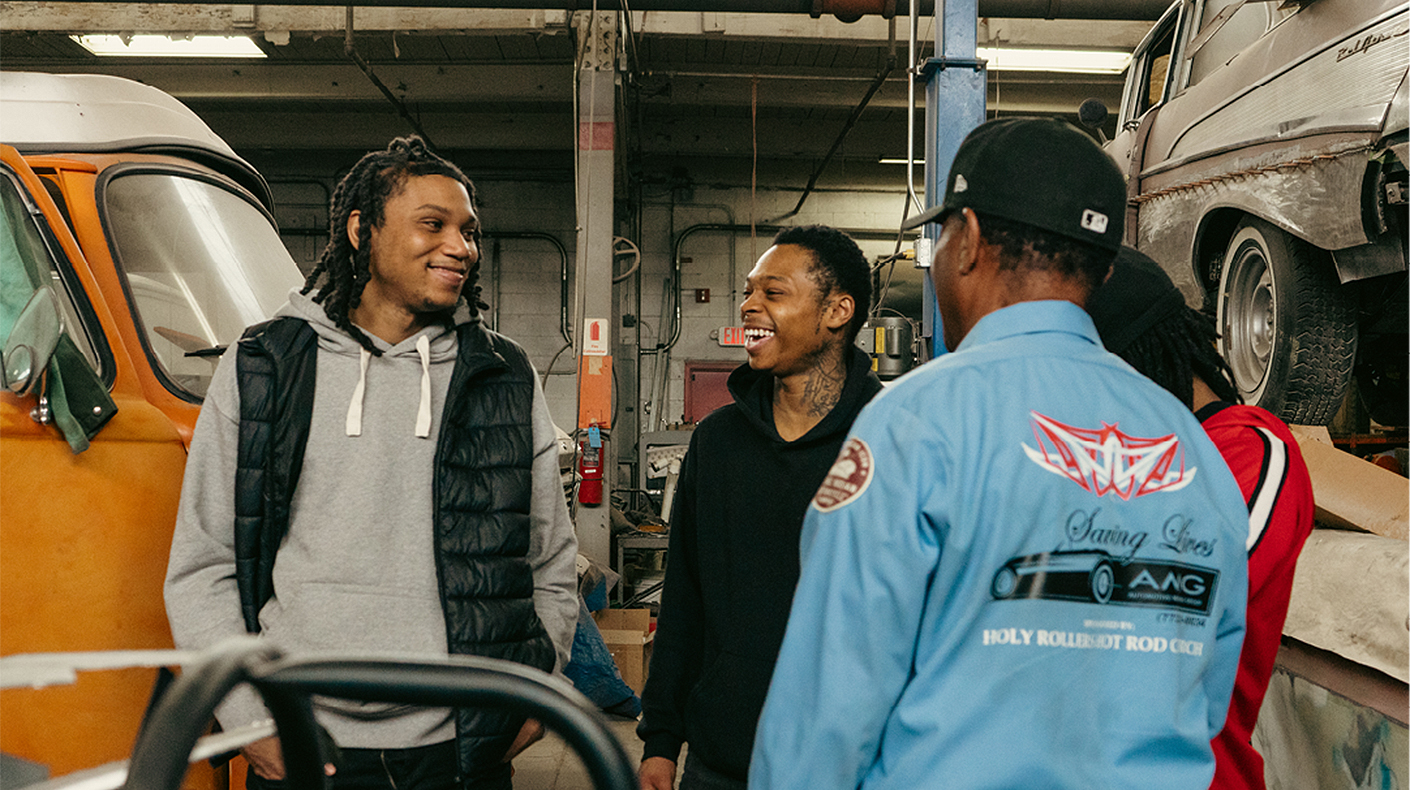
AMG's successful training program emphasizes plenty of mentoring and affirmation, encouraging its students to realize their own value and potential as they acquire hands-on technical skills.
During his architectural career, Levesque acquired a taste for collector cars. The hobby opened doors for him, introducing him to people and venues he never thought he'd connect with. The collectors he met didn't care about each other's backgrounds--all that took a back seat to a shared love of the automobile. Now Levesque wants to open those same doors for these kids.
AMG's most junior apprentices start out building car models. As they grow, they move up to restoring bicycles and other old-school gadgetry.
"We've got a whole bunch of vintage refrigerators from the '50s--the big round Andy and Mayberry types--and we got old gas pumps," says Levesque. "Now they know how to use the tools better; they know how to use the sandblasting equipment better. We get them to redo these old refrigerators, paint them automotive colors and do pinstriping on them--and we get them to restore the old gas pumps. Once you get through that phrase, okay, now you're ready to start working on some cars."
Because most of AMG's students come from fatherless households, they crave mentorship. Volunteers work side-by-side with the trainees, accompanying them on their journey with plenty of encouragement and affirmation. AMG's "crash-course" program boasts an 85% success rate in advancing students on to technical schools or placing them in jobs with over 80 of the nonprofit's automotive "hiring partners."
"We're not trying to be a school," Levesque confides. "What we want to do is take individuals that have nothing and no confidence level at all, and build them up so that when they finish our program they can [continue on] with confidence because of the background and experience they've had through the AMG program."
The program has been a confidence-builder for Levesque as well. "I was frustrated about [the level of violence in Chicago]. I felt the government should do something about it, or the mayor of Chicago should do something about it…" he says. "But God had another plan and chose me to do something about it."
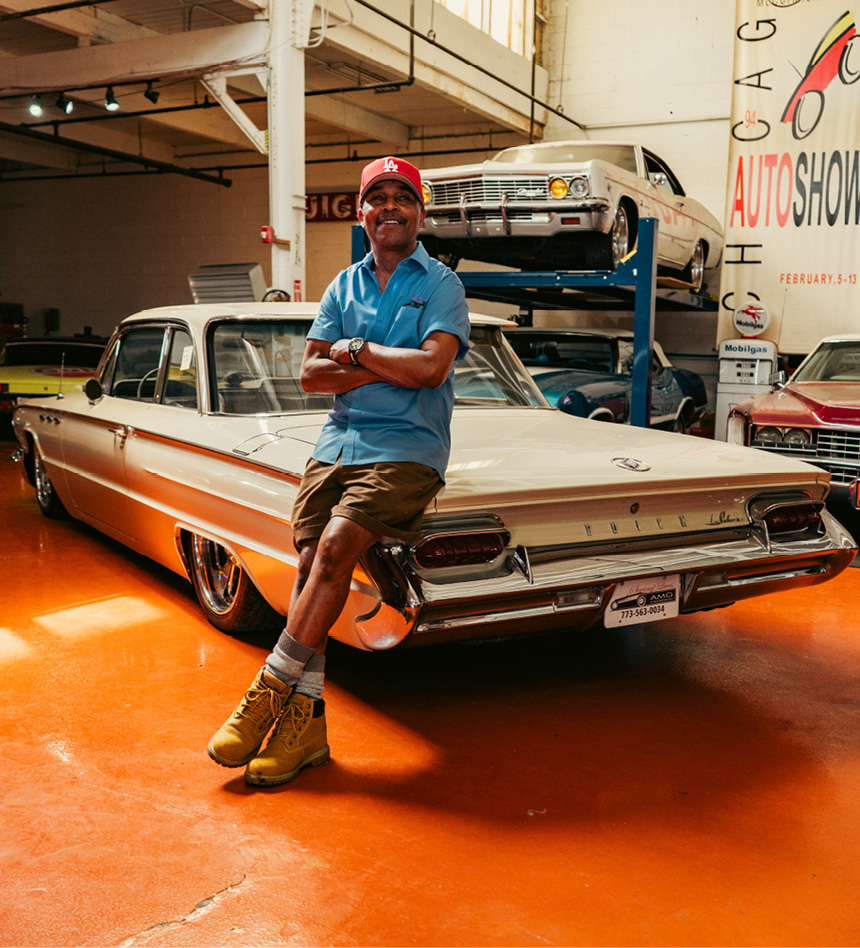
Alex Levesque, founder of AMG in Chicago. "What we want to do is take individuals that have nothing and no confidence level at all, and build them up," he says.
But AMG is doing more than giving these young people a future. The charity is providing for the automotive trade's future as well--by connecting young, motivated and talented workers with businesses desperately in need of them.
It's a win-win answer to a very real problem. As Boomers and early Gen X'ers exit the workforce, and Millennials move into leadership positions, there simply aren't enough incoming Gen Z'ers to fill the gaps. From its OEM dealerships, to its collision-repair centers, to its specialty-equipment manufacturing operations, to its restoration and specialty build shops, America's automotive sector is facing a serious labor shortage, with experts predicting the situation may only get worse.
"Everybody's looking for talent, and there's not enough people getting involved in this industry to fill that void, so that's what we're trying to do," says Levesque.
Thankfully, AMG isn't alone in addressing the issue. Throughout the industry, there are a growing number of grassroots programs emerging to offer diverse solutions to the problem. The only question is whether these efforts are spreading widely and quickly enough to make any appreciable difference.
"From today to 2031, the Bureau of Labor Statistics is saying that we need more than 73,000 auto technicians in the United States. That's a big number," notes Kira Daczko, regional admissions director at the Universal Technical Institute (UTI) campus in Sacramento, California. To help people put that figure in perspective, she often tells them to take a drive through their neighborhood, count all the cars they see, and then "really think about this and what the demand is."
Generating STEAM
From his vantage point in Columbus, Ohio, Sef DeChristopher sees that growing demand. But more importantly, he sees the need to reach out to youth who hunger for something meaningful in their lives. Most of all, he believes the automotive industry can help them find it.
"What really gets me going is hearing others say young people just want to be on their phones," he opines. "That's not necessarily true--maybe try passing on or sharing some of your skills, vehicles or time with them… They're on their phones because they have nothing and no one else to guide them."
Just before COVID hit, DeChristopher had opened a fabrication shop, but when the pandemic began shuttering businesses, he had an epiphany: "I was like, hey, I've got all these tools, I've got 5,000 sq. ft., and I've got some old cars. What if I just open it up to some of these young people who want to learn some skills?"
The result is the Science, Technology, Engineering, Art and Mathematics (STEAM) Cathedral, a faith-based, automotive-oriented nonprofit dedicated to teaching skills and concepts usually unavailable in public schools, especially in underserved communities. In their coursework, students learn and apply STEAM concepts to the building and racing of karts. The Cathedral also offers a visual storytelling course for those interested in podcasting and visual arts with motorsports as the primary setting.
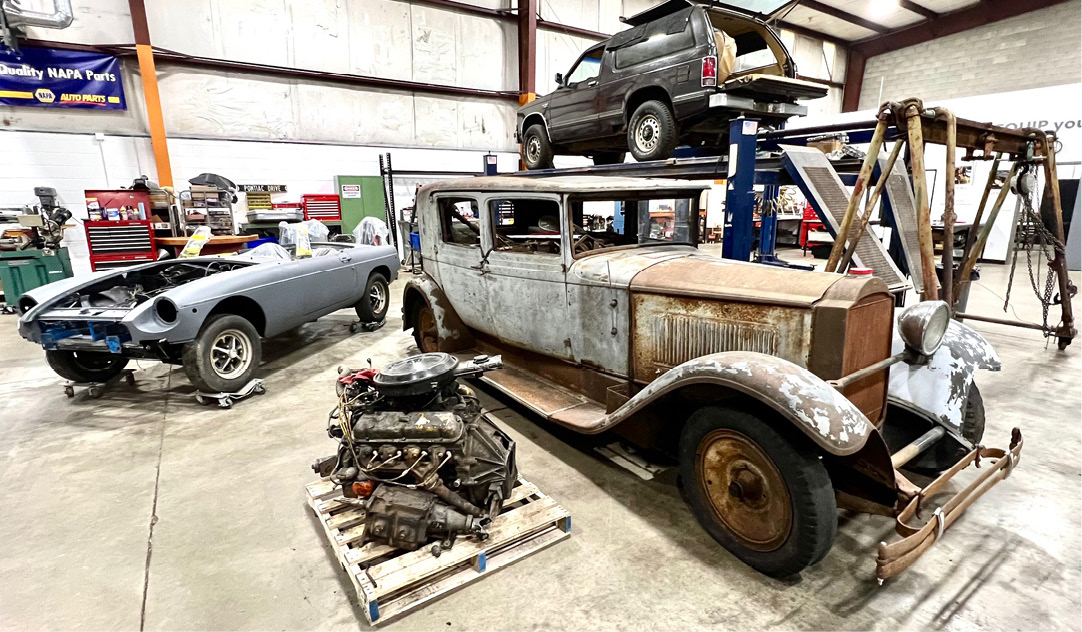
Vehicles awaiting their transformation at the STEAM Cathedral. The Cathedral emphasizes mentoring, personal guidance and authentic interaction in a safe learning space for young people.
Much like AMG in Chicago, the Cathedral stresses mentoring, personal guidance and authentic interaction, helping students discover their potential in a supportive environment. Key values include honor, integrity, respect, excellence and community building.
In fact, DeChristopher chose the Cathedral moniker as a metaphor. "It takes an average of 150 to 250 years for a traditional cathedral to be built," he explains. "Imagine being that first person laying the foundation. No one knows who you are… But 200 years later, there's this beautiful masterpiece that is all-inspiring on a strong foundation that will last for generations."
Among the Cathedral's apprentices is Ciara Hall, a 17-year-old high school graduate with a passion for horses and an interest in pursuing graphic design in college. She discovered STEAM Cathedral through her father's involvement with a Christian outreach, and says she has learned valuable technical and life skills. She especially credits the program with sparking her interest in motorsports and imparting the confidence to network with others.
"After the program, I'm going to take the skills that they've given me and apply that into college," she says, adding that while "we haven't run on the race track yet, if I really do like it and want to advance ahead, maybe I'll dive into motorsports more."
Meanwhile, Maxwell Hartman, age 17, recently joined the Cathedral program. Homeschooled, he always had an interest in the mechanical, especially bicycles and cars. "I've been, like, categorizing cars since I was three," he relates. At the Cathedral, he learned welding, fabrication, bodywork, metalworking and painting.
"I really enjoy welding; it's very tactile," he says. "I'm a musician, so it's kind of important to me feeling a trigger underneath your finger, knowing how far to depress it, knowing the distance you need to keep the welder from your metal…joining parts together to create something is really cool and satisfying."
A 'Kustomized' Solution
While community-based programs like AMG and STEAM Cathedral have devoted themselves entirely to recruiting and training next-gen talent, specialty automotive businesses are also confronting the industry's labor challenges through some creative thinking of their own.
When ACME Chop Shop in Grand Junction, Colorado, encountered difficulty bringing new auto restoration employees up to speed, the company decided to start the non-profit Kustom Built Cars program to train aspiring young builders.
"We were having a bunch of people come in here wanting to get jobs in the industry, but by the time we would bring them in as interns, we were kind of losing money. Your mechanic isn't working on what they're supposed to be working on--they're teaching," explains Shelby Robison, ACME's executive assistant and secretary on the Kustom Built Cars board of directors.
Launched five years ago as an intensive basics course for those interested in auto restoration, Kustom Built Cars has grown into a five-month, hands-on educational workshop geared especially to young adults aged 18–25. Students learn an extensive variety of restoration skills, plus the day-to-day operational knowledge needed to run a successful hot-rod/custom-car shop. Workshops average two to five students per term, with their $19,500 tuition covering their learning modules, tools and safety equipment. Because the program is non-accredited, grant money isn't available to students. However, Kustom Built Cars has found a workaround to aid young men and women who struggle with costs.
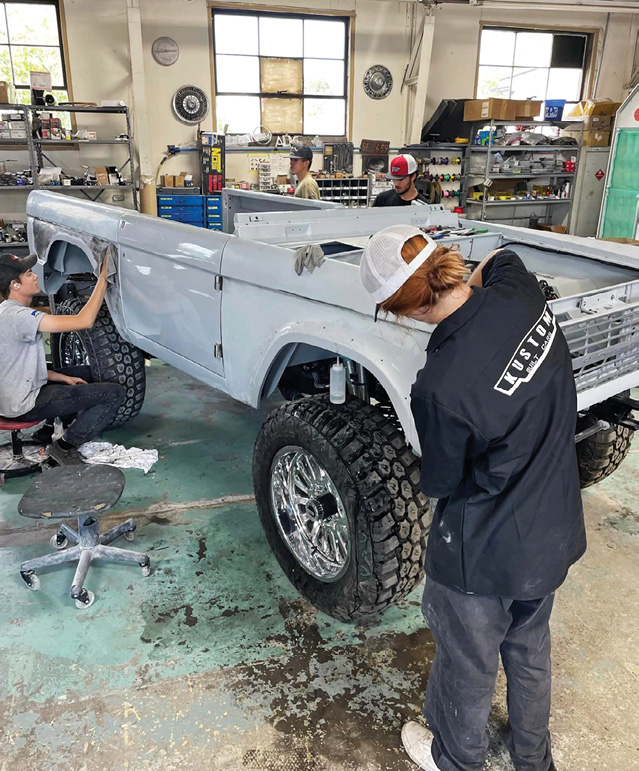
Aspiring young automotive restorers training at Kustom Built Cars in Grand Junction, Colorado. The finished truck will be sold at Barrett-Jackson, with proceeds going back into the Kustom Built program for future students.
"We build a project truck and then we take it to Barrett-Jackson and sell it. The money comes back to build a new one and give scholarships to those students who can't afford it," says Robison. "Honestly, like probably 85% of our students who have gone through this nonprofit, we have given scholarships to."
Meanwhile, Robison is often found making the rounds at high school career days, hoping to encourage teenagers otherwise hesitant about a mechanical trade. "A lot of students shy away from my booth because they don't know how to do anything [automotive]. But when they overhear in my speech that you don't have to know any skills, then all of a sudden, their faces light up," she says.
About a month before the workshop's end, Robison meets with students to discuss their future plans. If ACME Chop Shop has openings, some might fill those positions. Others may land with different local businesses, or even relocate to pursue careers outside Colorado.
"I help them find jobs in the industry… We have a huge list of shops in the United States that want to hire our students," she says, adding that some go on for further schooling at technical institutions like UTI.
"I tell them, 'If you go into this industry, in a couple of years down the road, if you need help, call me.' I want to be a life support… I will always give them a good reference if they were good and had a good work ethic."
Tomorrow's Technicians
There are, in fact, many ways for industry businesses to help address the youth recruitment and training issue. Based in Northbrook, Illinois, automotive chemical maker Old World Industries has a history of supporting technical schools, notably the Milwaukee Area Technical College (MATC).
"They've reached into the community of Milwaukee and the inner city, and are trying to give the underserved opportunities for career paths in automotive," explains Brian Bohlander, Old World director of marketing for sports and partnership.
Bohlander believes that filling the labor pipeline requires industry engagement at the nation's high school level. Although the situation is slowly changing now, many high school shop programs were gutted over the past few decades, leaving a gaping void in mechanical and technical skills training.
Old World's involvement with MATC eventually led the company to also support Technicians of Tomorrow, an Automotive Dealers of Metro Milwaukee competition in which top high school auto technology students vie for prizes ranging from cash and tools to college scholarships. Old World contributes co-branded PEAK pit shirts and other support to the contest.
"It really comes down to creating the opportunity for students to touch vehicles, giving them a platform to compete against one another for prizes, scholarships and bragging rights," says Bohlander. "That in turn gives them the opportunities and recognition to get into vocational schools. Area dealers then work with those schools and ultimately get them placed within dealerships or other opportunities within the automotive aftermarket."
In addition, Old World partners with the Automotive Society of Engineers (ASE) Education Foundation, to provide support and input to its programs for young people.
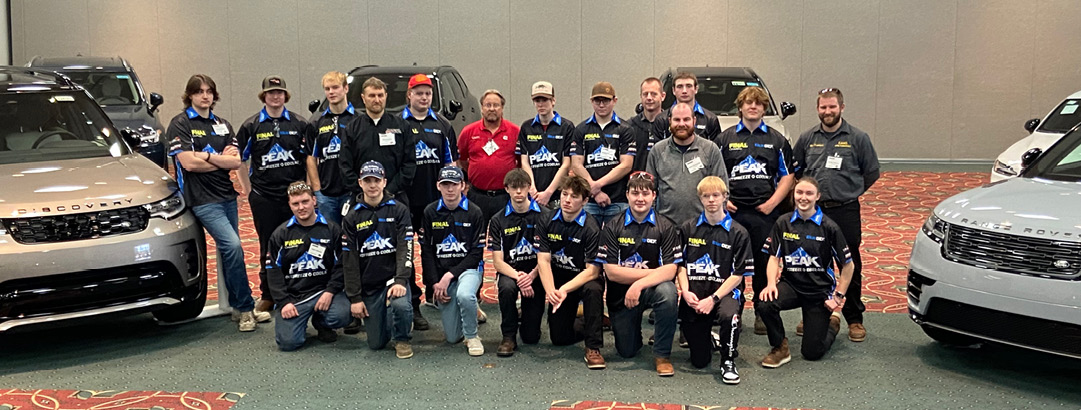
Old World Industries supports the Technicians for Tomorrow competition, supplying co-branded PEAK pit shirts to the students. Company officials believe every aftermarket business has a stake in engaging young people.
"Ultimately, what they're trying to do is build a sustainable future for the aftermarket," Bohlander explains. "To do that, they're making sure that they have the curriculum needed to train technicians appropriately. But they also have relationships with dealers and manufacturers because they want to make sure they're getting the right information to develop education modules [for] these students."
"And that involvement really has paid dividends for everybody," he asserts. "It's an ecosystem… The more information that they get from the aftermarket that they can communicate to schools, technicians and other industry partners, the better they can help everybody understand where the problems are or where the new technology is evolving. Everybody wins."
Back at UTI, Daczko says the real challenge is exposing young people to an industry they may know little about and providing the big picture of what's available to them: a good-paying career in an exciting, dynamic sector offering real opportunities for growth and personal satisfaction.
"We need students that are creative, but also hands-on kinesthetic learners," she says. "Students who can problem-solve and utilize math, science and technology, but who can also understand engineering concepts."
After entering the STEAM Cathedral program, 16-year-old Joey Chambers is sold on the concept. "I came here because I've always had a passion for automotive engineering… That's always something I've wanted to do with my life," he says. "I've also had this itch for racing… I've had opportunities [here] to learn how to truly engineer a kart and how to apply that to engineering to a car because they're very similar." He now knows an industry career is in his grasp.
It's a start, but Bohlander believes the industry's growing labor shortage is an all-hands-on-deck situation requiring a wide range of innovative, grassroots solutions.
"It's our responsibility--and 'ours' meaning everyone in this ecosystem, whether it's manufacturers like us making aftermarket products, or automobile manufacturers and everyone else--to make sure that we develop the next generation to keep this industry thriving," he emphasizes. "All of us have that responsibility of giving back to make this industry not only sustainable, but better in the long term."


